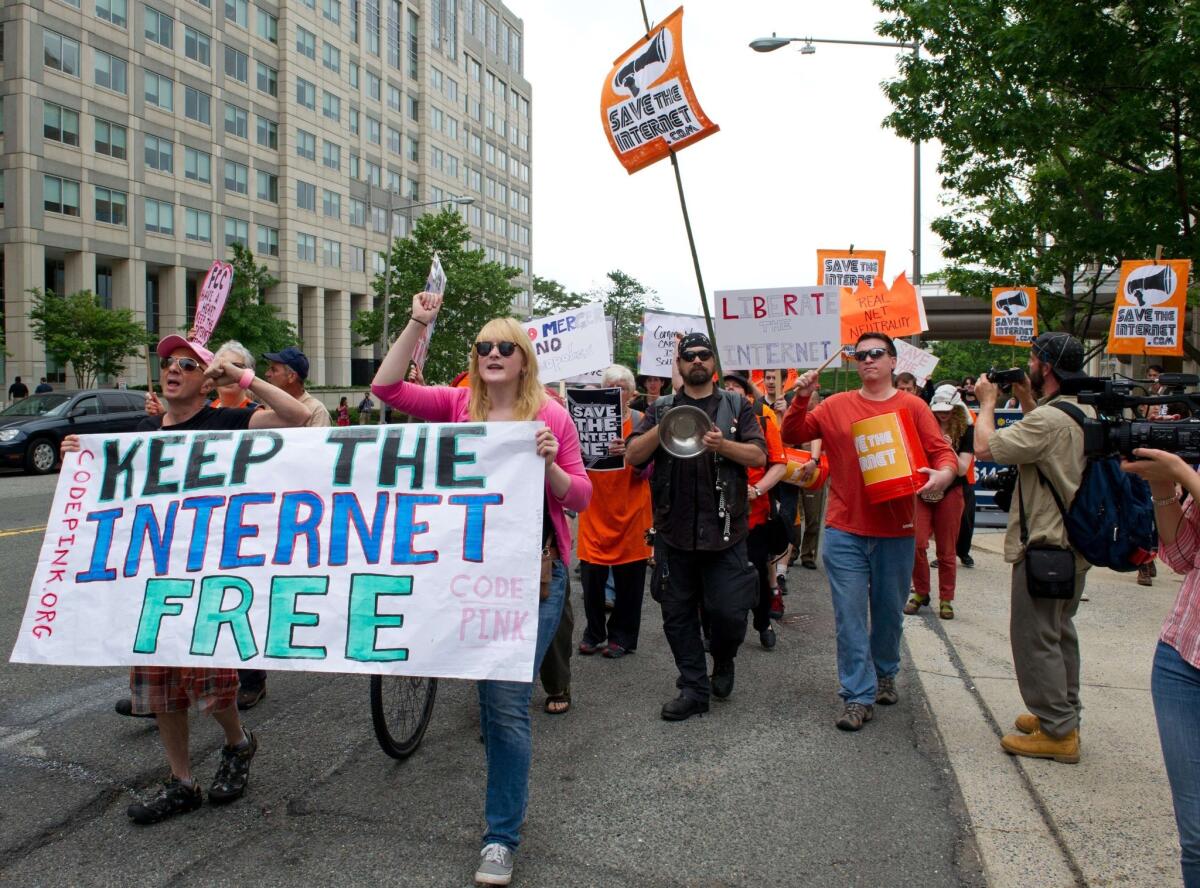Opinion: Foes of FCC net neutrality proposal are too hung up on second ‘tier’

- Share via
Opponents of Federal Communications Commission Chairman Tom Wheeler’s proposed Net neutrality rules denounced them Thursday before the text had even been released, reflecting how little this debate has been about policy and how much has been about slogans.
The actual proposal (released Thursday afternoon) won’t lead to a “two-tiered Internet,” contrary to what its critics have been saying for weeks. It will lead to one with an unlimited number of potential tiers. Or none, depending on how you define the word.
First, let’s dispense with the obvious flaw in the “Wheeler’s creating a two-tiered Internet” critique: the commercial relationships that proliferate online already segregate thinly capitalized start-ups from deep-pocketed incumbents. In other words, there’s already a way to pay to deliver traffic faster and in higher quality to end users. How many innovative search companies out there can afford to replicate Google’s global content delivery system? What the FCC is focusing on is how traffic is managed on just a portion of the Internet, albeit a very important one, and whether to allow a management technique that favors some sites’ traffic by degrading others’.
Now let’s look at what the draft rule proposes to do. It has three main elements: enhancing an existing rule that requires ISPs to disclose how they manage traffic on their networks, reframing an overturned rule barring ISPs from blocking legal content and services, and finding a new way to guard against ISPs picking winners and losers (that is, discriminating unreasonably). I’ll focus on the second and third pieces because they’re the most controversial.
The text of the proposed no-blocking rule is the same as in the FCC’s 2010 order. But to avoid the legal problem that led the court to strike down the 2010 version, the commission’s notice of proposed rulemaking argues that the commission has to leave room for ISPs to “negotiate terms of service individually with edge providers.” It adds, “such individualized arrangements for priority treatment would be subject to scrutiny under the proposed commercial reasonableness rule and prohibited under that rule if they harm Internet openness.”
Similarly, in place of the 2010 “unreasonable discrimination” standard, the proposed rule would allow arrangements between ISPs and edge providers -- tiers, in the critics’ parlance -- unless they were commercially unreasonable. The new standard “would prohibit as commercially unreasonable those broadband providers’ practices that, based on the totality of the circumstances, threaten to harm Internet openness and all that it protects,” the notice states. “At the same time, it could permit broadband providers to serve customers and carry traffic on an individually negotiated basis, ‘without having to hold themselves out to serve all comers indiscriminately on the same or standardized terms,’ so long as such conduct is commercially reasonable.” The quote cited in the notice is from the D.C. Circuit Court of Appeal’s ruling against the 2010 Net neutrality order.
One key point here is the allowance for individually negotiated deals, plural. The proposal opens the door not just to “pay for priority,” but a wide variety of commercial arrangements between ISPs and edge providers (that is, websites, apps and services). In fact, the notice contemplates a world where ISPs offer different terms of service to different edge providers but do not necessarily prioritize traffic. It asks the public to comment on whether paid prioritization is so threatening to Internet openness that it should be prohibited, and if so, under what authority the commission could do so.
Now, if you think of a “tier” as a data pathway that jumps ahead of other traffic in the queue, banning prioritization would eliminate tiering without ruling out other potential ways ISPs could help edge providers for a fee. Unfortunately, the notice doesn’t offer any ideas about what those other arrangements might look like. Instead, it tries to identify the factors the commission would use to judge whether a deal is commercially reasonable, including its effect on competition, consumer choice and free speech.
In his remarks, Wheeler also tried to define what the new arrangements would look like by what they could not do. They could not slow consumers’ connections below what they’d paid for, prioritize those connections in a way that deprives consumers of the full value, or charge edge providers “to use the bandwidth for which the consumer has already paid,” he said.
Finally, the proposed no-blocking rule would require a minimum level of broadband access, which sheds a little more light on what commercially reasonable deals couldn’t do. “Requiring this minimum level of access under the no-blocking rule will ensure that all users have access to an Internet experience that is sufficiently robust, fast, and effectively usable,” the notice states. “This includes both end-user consumers and edge providers of all types and sizes, including those content providers who do not enter into specific arrangements with broadband providers. In short, our approach will enable consumers to access the content, services, and applications they demand and ensure that innovators and edge providers have the ability to offer new products and services.”
Whether the proposed rule actually could do what the notice asserts it would do is the subject of some debate. But then, that’s why the FCC is taking public comments -- to gather evidence on whether Wheeler’s proposal can achieve his stated goals, and whether there’s a better route to the same end.
More to Read
A cure for the common opinion
Get thought-provoking perspectives with our weekly newsletter.
You may occasionally receive promotional content from the Los Angeles Times.







